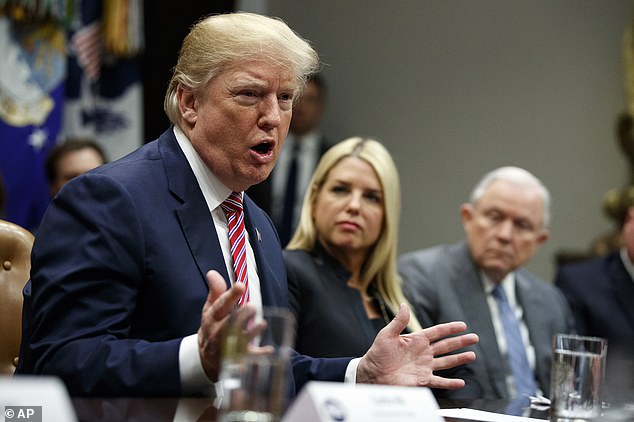It’s easy to dismiss many presidential candidates’ campaign promises as unrealistic, largely because Congress would need to approve them. However, tariffs are an exception to this rule.
Presidents have considerable authority to impose tariffs on both allies and adversaries, a power former President Donald Trump used extensively starting in 2018 during his trade war. This authority is why experts are both alarmed and perplexed by Trump’s recent threat to use this tool once again.
At a rally in Wisconsin last weekend, Trump vowed to impose drastic tariffs on countries that move away from the US dollar.
“Many countries are abandoning the dollar. They won’t be doing that with me,” Trump declared. “If you leave the dollar, you’ll face a 100% tariff on your goods and won’t be able to do business with the United States.”
The US dollar remains the dominant global reserve currency, crucial for international trade and the functioning of the global economy. Trump’s threat seems directed at countries like China and Russia, which have explored alternatives to the dollar.
While tough rhetoric about defending the dollar might be appealing on the campaign trail, experts warn that such extreme tariffs could have serious negative effects on the American economy.
Maury Obstfeld, a senior fellow at the Peterson Institute for International Economics, criticized Trump’s proposal as “incoherent, tough-guy posturing” during a CNN interview. Obstfeld, who was previously the chief economist at the International Monetary Fund (IMF), acknowledged that while some countries are seeking alternatives to the dollar, it remains the world’s primary currency.
The “crazy” tariff proposal The conditions under which Trump might impose a 100% tariff remain unclear. Obstfeld noted that such high tariffs would likely lead to increased prices for consumers, especially if applied broadly.
“A 100% tariff would have a severe impact on the cost of imported goods and drive up inflation,” Obstfeld said.
Christine McDaniel, a former senior trade official in the George W. Bush administration, described Trump’s tariff proposal as “crazy” and “silly season campaign rhetoric.”
“Trump’s response to nearly everything seems to be tariffs,” said McDaniel, now a senior research fellow at George Mason University’s Mercatus Center.
McDaniel explained to CNN that Trump could likely impose these tariffs unilaterally, potentially without Congress’s approval, following reports from the United States Trade Representative (USTR) under Section 301 or from the Commerce Department under Section 232. However, Congress might amend laws to limit such trade authority.
Alex Durante, an economist at the Tax Foundation, warned that 100% tariffs could pose significant economic risks.
“Tariffs of this scale would almost certainly increase the risk of a recession, as consumers have limited spending power,” Durante said.
It remains uncertain how serious Trump is about this proposal; it might be intended as a negotiating tactic rather than a concrete plan.
Brian Hughes, a senior adviser to the Trump campaign, asserted that Trump’s policies would “stimulate growth, reduce inflation, boost American manufacturing” and protect workers from “unfair policies favoring other nations.”
Hughes defended Trump’s record against past Wall Street forecasts, which predicted negative impacts that, according to him, did not materialize.
Inflation concerns The Trump campaign has not clarified how the 100% tariffs would be implemented or what would trigger them.
A spokesperson for Vice President Kamala Harris declined to comment on her stance regarding these tariffs.
Despite Trump’s assurances that his trade policies would not cause inflation, studies consistently show that American consumers and industries bear most of the cost of US tariffs, including those imposed by Trump.
Economists agree that Trump’s proposed tariffs would likely be inflationary. Kent Smetters, from the University of Pennsylvania’s Wharton School, where Trump received his undergraduate degree, confirmed that such tariffs would lead to higher prices. He also noted that retaliatory tariffs from other countries could exacerbate the situation.
During a recent debate, Trump claimed that many “top professors” at Wharton view his plan as “brilliant.” However, Wharton did not respond to requests for confirmation of faculty support for Trump’s plan.
A ‘Liz Truss moment’? Joe Brusuelas, chief economist at RSM, described Trump’s 100% tariff threat as “radical” and “a profoundly bad idea.”
“I’m not sure what Mr. Trump is talking about, and frankly, I don’t think he knows either,” Brusuelas said, echoing a sentiment Trump himself used about President Joe Biden.
Brusuelas cautioned that while candidates can make radical proposals, a president must manage global financial markets carefully. He warned that such tariffs could lead to a market panic similar to the reaction to former UK Prime Minister Liz Truss’s poorly received tax proposals in 2022.
“If this were attempted, it could trigger a severe reaction from the US bond market, akin to the loss of confidence experienced in the UK,” Brusuelas said.
Nonetheless, some business groups are preparing for the possibility of a return to Trump’s “Tariff Man” approach.
Matt Priest, president and CEO of the Footwear Distributors & Retailers of America, emphasized the importance of taking Trump’s proposals seriously due to his past actions. “We are advising our members on how to prepare for the potential impact of these policies.”
Ironically, Trump’s proposed 100% tariffs could potentially encourage countries to further distance themselves from the dollar, contrary to his stated goal.
“The kind of rhetoric Trump is using might actually accelerate the move away from the dollar,” said Obstfeld, the former IMF economist.

